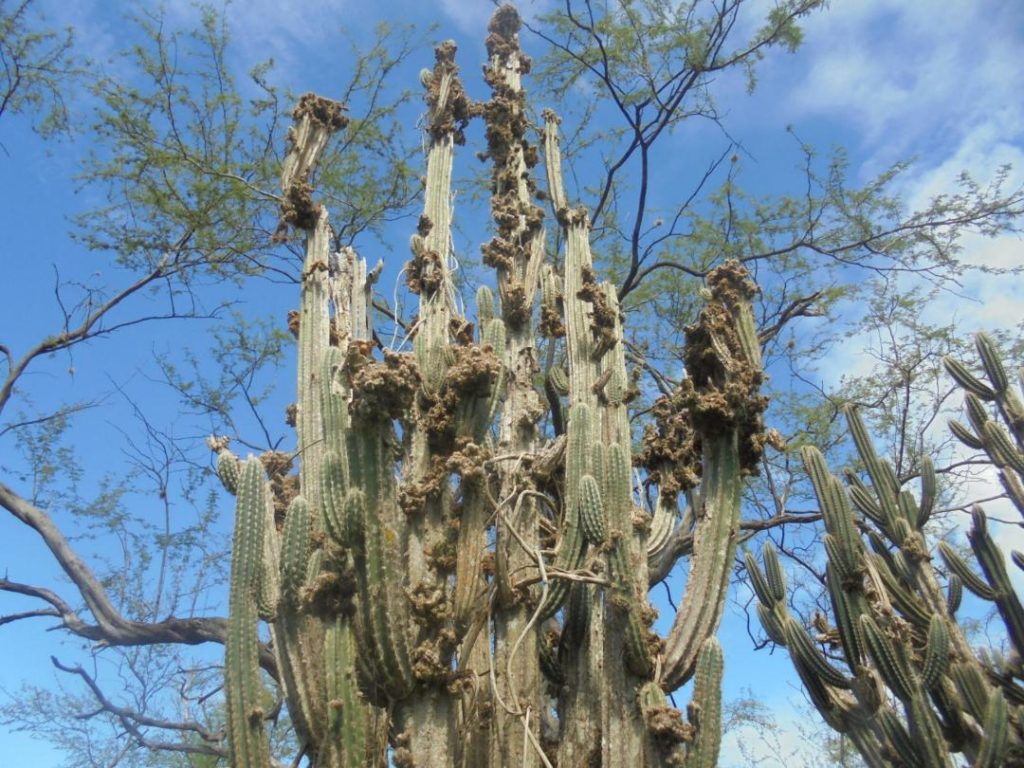
Photo of infested cactus at Cabo Rojo National Wildlife Refuge, Puerto Rico. Taken August 20, 2018 by Yorelyz Rodríguez-Reyes
Three and a half years ago, I blogged about the threat to columnar cacti in Puerto Rico from the Harrisia cactus mealybug. The mealybug clearly threatens the endemic cacti of the Caribbean islands, and possibly some of the hundreds of other columnar cacti growing across two million square miles of desert ecosystems that straddle the U.S.-Mexico border region.
I am pleased to report that scientists continue efforts to find biocontrol agents to reduce this insect’s damage on Caribbean islands. Much of this work is being done by the Center for Excellence in Quarantine and Invasive Species at University of Puerto Rico. The team consists of Michael West Ortiz, Yorelys Rodrígues Reyes, Ferdinand Correa and Jose Carlos Verle Rodrigues.
As of February 2019, the Center is conducting host specificity tests on a primary parasitoid of the Harrisia Cactus mealybug — Anagyrus cachamai. This wasp was found as a result of almost a decade of searching in South America and other locations. It is native to Argentina and Paraguay (Triapitsyn et al. 2018; sources listed at the end of the blog).The Center also continues surveys and studies of other primary and secondary parasitoids of the mealybug.
The work to develop a biocontrol agent for the mealybug continues despite continuing uncertainty about the true species of the mealybug. At the time of its discovery on Puerto Rico, the mealybug was believed to belong to a species used as a biocontrol agent for invasive cacti in Australia and South Africa, designated as Hypogeococcus pungens. However, H. pungens is now thought to be a species complex, and the species in Puerto Rico differs from the earlier designation (Triapitsyn et al. 2018).
Apparently the mealybug was introduced in Puerto Rico around 2000 — probably on the ornamental common purslane (Portulaca olerácea), an annual succulent. (Note: the introduction was on a host different from the vulnerable cacti.) Within five years of the first detection in San Juan, the mealybug was sighted on cacti on the other side of the island in the Guánica State Forest and Biosphere Reserve. By 2010, the mealybug was widely distributed in most dry districts. Surveys found it in all 11 municipalities surveyed in southern Puerto Rico. At some locations, infestation levels were extremely high – e.g., 86% of stems surveyed were infested at Guánica. Infestation rates were lower in other municipalities. As of 2010, infestations were estimated to be present on about 1,400 km2 on the southern coast; the rate of new infestations suggests that the mealybug was spreading rapidly (Segarra-Carmona et al. 2010). I have been unable to obtain more recent estimates.
The
mealybug impacts seven of 14 native cactus species occurring in dry forests of
the island, including three endemic and two endangered species in the subfamily
Cactoideae. The two endangered species are Harrisia
portoricensis and Leptocereus grantianus (USDA ARS). The tissue
damage caused by the mealybug interferes with sexual reproduction and can cause
direct mortality of the plant (Triapitsyn et
al. 2018). These
cacti provide food or shelter for endemic bats, birds, moths and other
pollinators (Segarra & Ramirez; USDA ARS). The mealybug is also now killing
native cacti on the U.S. Virgin Islands (H. Diaz-Soltero pers. comm. August
2015).
USDA Funds Conservation Efforts Despite Apparent Absence of a Constituency Calling for Such Action
Efforts to identify and test possible biocontrol agents targetting the Harrisia cactus mealybug received significant funds from the Plant Pest and Disease Management and Disaster Prevention Program. This is a competitive grant program managed by APHIS. It is permanently funded and thus not subject to the vagaries of annual appropriations. Until last year, this program operated under Section 10007 of the 2014 Farm Bill. With passage of a new Farm Bill, it is now designated as Section 7721 of the Plant Protection Act.
Since Fiscal Year 2018, APHIS has had authority to spend more than $60 million per year on this program. In Fiscal Year 2017, , the program provided $120,000 to an unspecified federal agency, $70,000 to an academic institution in Puerto Rico (presumably the Center), $15,000 to another academic institution in California, and $3,000 divided among two APHIS facilities – for a total of $208,000. The next round of funds came in FY19, when the program provided $277,267 to an unspecified federal agency to continue work on biocontrol. In addition, the program provided $78,507 to an unspecified federal agency to “safeguard[e] genetic diversity of native and listed cacti threatened by Harrisia cactus mealybug in Puerto Rico”.
No Apparent Action on Threats to Opuntia Cacti
In my earlier blog, I also described the threat to flat-padded Opuntia (prickly pear) cacti from the cactus moth Cactoblastis cactorum. Various federal, state, and academic entities received $463,000 from the permanent fund in Fiscal Year 2016 and another $100,000 in FY2017. No cactus moth programs have received funds in more recent years.
SOURCES
Segarra-Carmona, A.E., A. Ramirez-Lluch. No date. Hypogeococcus pungens (Hemiptera: Pseudococcidae): A new threat to biodiversity in fragile dry tropical forests.
Segarra-Carmona, A.E., A. Ramírez-Lluch, I. Cabrera-Asencio and A.N. Jiménez-López. 2010. FIRST REPORT OF A NEW INVASIVE MEALYBUG, THE HARRISIA CACTUS MEALYBUG HYPOGEOCOCCUS PUNGENS (HEMIPTERA: PSEUDOCOCCIDAE). J. Agrie. Univ. RR. 94(1-2):183-187 (2010)
Triapitsyn, Aguirre, Logarzo, Hight, Ciomperlik, Rugman-Jones, Rodriguez. 2018. Complex of primary and secondary parasitoids (Hymenoptera: Encyrtidae and Signiphoridae) of Hypogeococcus spp. mealybugs (Hemiptera: Pseudococcidae) in the New World. Florida Entomologist Volume 101, No. 3 411
USDA Agriculture Research Service, Research Project:
Biological Control of the Harrisia Cactus Mealybug, Hypogeococcus pungens
(Hemiptera:pseudococcidae) in Puerto Rico Project Number: 0211-22000-006-10
Project Type: Reimbursable
West Ortiz, M. pers. comm. February 2019
Posted by Faith Campbell
We welcome comments that supplement or correct factual information, suggest new approaches, or promote thoughtful consideration. We post comments that disagree with us — but not those we judge to be not civil or inflammatory.